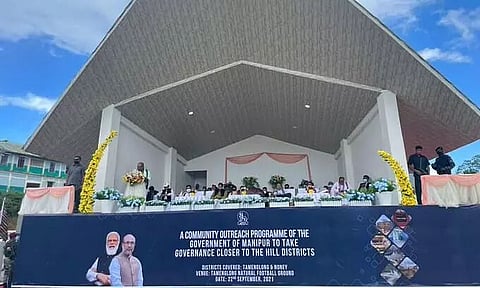
- Home
- Live Blog
- Breaking News
- Top Headlines
- Cities
- NE News
- Sentinel Media
- Sports
- Education
- Jobs

GUWAHATI: Manipur CM N. Biren Singh today tweeted that Kaimai Railway Station will be renamed as Rani Gaidinliu Railway Station, a political leader who led many movements against the British.
Rani Gaidinliu was a Spiritual and political leader who led a revolt against British colonial rule in India. She was born on 26th January 1915 at Nungkao, a Rongmei village in Manipur. Ranima, as she was known with respect and affection, had humble beginnings. At the age of 13, she came under the influence of Haipou Jadong, the leader who launched a religious movement that sought to reform the Zealiangrong ga communities. The movement grew into a political struggle to uproot British Colonialism from Manipur and the nearby ga-inhabited area.
By the late 1920s, British officials began to view the political underpinnings of the movement with deep suspicion as they saw it as undermining their authority. After the execution of Jadong in 1931, Rani Gaidinliu took up the leadership of the movement for independence. She was arrested in 1932 by the British authorities. She became a political prisoner but at the same time had emerged as a veteran leader of the resistance movement.
Rani Gaidinliu identified her people's struggle with the wider Indian freedom struggle. For her, the ga people's journey to freedom was part of India's wider movement for freedom. She also spread the message of Gandhi in the Manipur region.
During long years of incarceration, Rani ma had become popular and the issue of her imprisonment was raised in the British House of Commons. She was released from jail after 14 years when India won independence in 1947. She remained true to her convictions and continued to work for the protection of traditional ga customs, beliefs and traditions within united India. Rani ma consistently opposed groups advocating separation from India. Such a demand was in her view neither justifiable nor desirable. She withstood serious threats from armed insurgents which forced her to go underground in 1960. Her adversaries could not weaken her resolve. She was committed to her cause with little care for personal safety. She came overground on 16th January 1966. She was welcomed by the people of Zeliangrong.
Leaders of various political parties at the trial level had great regard for her work and her contribution to the common good. Her visits even to remote areas became legendary. Men and women, young and old, gathered simply to have a glimpse of her. She showed how it was possible to have pride in village customs and traditions and in ga culture and at the same time to be true to India.
Rani ma passed away on 17th February 1993. She left behind a vibrant legacy and instilled in the Zeliangrong people pride in traditional practices. Her life of struggle and her integrity marked her out as a figure we should all learn from and who can still inspire positive values in public life.
Rani Gaidinliu became a legend in her own lifetime.
She was honoured by Freedom Fighter Tamrapatra, 1972, Padma Bhushan, 1982, Vivekande Sewa Samman, 1983, Birsa Munda Award, 1966, Postal Stamp, 1996.
The government of India instituted Stree Shakti Puruskar in honour of five eminent women in Indian History which included Rani Gaidinliu, 2000.
The Hindustan shipyard Ltd. Launched an in-shore patrol vessel me Rani Gaidinliu for the Indian coast guard at Visakhapatnam, 6th November 2010.
Also Watch: